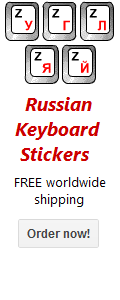 FR FR |
About us | Home | User agreement | Link to us |
How to Write Russian Names in English
Whether you’re a Russian wondering how to write your name in English, or a non-Russian speaker trying to transliterate Russian letters into English letters, you may be wondering how on earth to do so. If you’re struggling to change Russian names into English, then this article is for you!
The first thing you need to realise is that the Russian language uses the Cyrillic script, whilst English uses the Latin script. The process of transliterating Cyrillic, Russian names into Latin English is called Romanization. As well as being used primarily for citing Russian names and words in languages like English, who use a Latin alphabet, romanization is also necessary for computers to input Russian text without needing a Russian keyboard or word processor that can use Cyrillic. It might also be the case that you are not able to use a native Russian keyboard layout (JCUKEN), in which case you would use transliteration with the English QWERTY keyboard and then use an automated tool to convert the Romanised text into Cyrillic.
“In the past, there were many different ways of converting Russian names into English – as a result, there now exist several variants of common Russian names in English. These different spellings are exemplified in names like Yulia, Yuliya, Julia and Julha which all stem from the Russian name 'Юлия',” says Amalia Landtry, a linguistics expert at Writinity and Researchpapersuk
We can also see this in the different spellings of Dmitry, Dmitriy, Dmitri, Dimitri (from Дмитрий), and Zhukovsky, Zhukovski, Zhukovskiy, Jukovsky ('Жуковский').
Transliteration of Russian names into the Latin script is English orientated now. Romanization nowadays attempts to preserve, as much as possible, the original pronunciation and recognizable written look of the original Russian name. Below we’ll look at the best way to write Russian names in English and offer some examples of English spellings for Russian names. Remember that names should be written consistently in personal documents, particularly travel documents and other official documents. That means once you have chosen one English spelling, stick to it!
How to Write Russian Names in English
The Russian alphabet is phonetic, or nearly phonetic – this means that every sound in the Russian language has a corresponding letter in the alphabet. In English, many different spellings exist for the same sound – this is generally because English has borrowed spelling customs from many different languages (like French). For example, ‘through’ and ‘thru’ are both pronounced the same way but are spelt differently. Some letters in Russian can be directly translated to English.
Here is the Russian alphabet and it’s corresponding English letter translations:
| A | B | V | G | D | E | E | Zh | Z | I | J | K | L | M | N | O | P |
| A | Б | B | Г | Д | E | Ё | Ж | З | И | Й | К | Л | M | H | O | П |
| R | S | T | U | F | H | C | Ch | Sh | Shch | - | Y | - | E | Yu | Ya |
| P | C | T | У | Ф | X | Ц | Ч | Ш | Щ | Ъ | Ы | Ь | Э | Ю | Я |
However, other Russian letters present a greater problem for transliterations due to having no corresponding English sound. These include:
| В | Й | Х | Ц | Ч | Ш | Щ | Ъ | Ы | Ь | Э | Ю | Я |
| V, FF, W | J, Y | H, KH | C, TS | CH, TCH, TSCH | SH, CH, SCH | SHCH | Hard sign, cannot be translated | I, Y | Soft Sign, cannot be translated | E | YU, JU | YA, JA |
So now let’s take the common Russian last name Муравьёв and Romanize it. The ‘M’ is correspondent with the Latin M, whilst the ‘y’ can be transliterated directly to a ‘u’ or a ‘y’. Some spellings also include it as a ‘ou’. The ‘р’ becomes a Latin ‘r’, ‘a’ is correspondent with the Latin ‘a’, and the ‘в’ becomes a ‘v’. The ‘ь’ becomes the sound ‘y’, with many variants existing: it can become a Latin ‘y’ or ‘I’. Lastly, the ‘ё’ becomes a Latin ‘ё’ and the ’в’ is once again a ‘v’. The result is Muravyev, or Muraviev. Other variations include: Muravyov, Muraviov, Murav'ev, Muravev, Murav'yev, Murav'ov, Muravjov, Muravjev, Mouravieff, Muravieff, Mouravief, Muravief, Muraviof, Muravioff.
“As you can see, there is a lot of room for experimentation when transliterating Russian names into English. You can choose whichever style you prefer!” Says Alaya Griffith, a translator at Draftbeyond and Lastminutewriting An interesting side note is that you can often determine where someone of Russian descent moved to, due to the transliteration of their name. That is, if they moved to Poland, France, Germany or Britain, their names were spelt differently in the Latin alphabet.
Ashley Halsey is a professional writer at Luckyassignments.com and Gumessays.com who has been involved in many projects throughout the country. Mother of two children, she enjoys traveling, reading and attending business training courses.
Copyright 2001- 2026 MasterRussian.com | Privacy Policy | Contact Us
 Russian Lessons
Russian Lessons
- Russian alphabet
- Names of letters
- Russian Q&A new
- Pronunciation: Cons.
- Pronunciation: Vowels
- Noun Gender/Number
- Cases of Nouns
- Russian Greetings
- Personal Pronouns
- Learning Russian
- 1000 Common Words
- 500 Russian Verbs
- Top Russian Nouns
- » All lessons
- » Guest lessons
 Browse Topics
Browse Topics
- Start learning Russian
- Forum
- Bookstore
- Dictionaries
- Russian - basic
- Russian - adv
- Pronunciation
- Russian Blog new
- Reading
- Test & quizzes
- Translation
- Verbs
- Verb Conjugations
- Russian numbers
- Russian Tests new
- Vocabulary
- Writing
- Folk music
- Fun stuff
- Leo Tolstoy
- Learner's lore
- Literature
- Personal blogs
- Picture Dictionary new
- Proverbs
- Publications
- Radio & TV
- Russian culture
- Schools in Russia
- Russian Words
- Russian names
- Software
- Russian Words iPhone
Clicks the "Like" button below to get daily updates on Facebook!
Click "Add to circles" to learn Russian on Google+

Search MasterRussian

English » Russian dictionary

WORD OF THE DAY
![]() RSS
|
iGoogle
|
My Yahoo!
RSS
|
iGoogle
|
My Yahoo!
Meaning: door, entry
Pronunciation: [dvyehr']
Learn Russian words »
TODAY'S STREET SIGN

Russian: Продукты. Круглосуточно
English: Groceries. 24x7
FOLLOW US ON TWITTER

MasterRussian on Twitter


